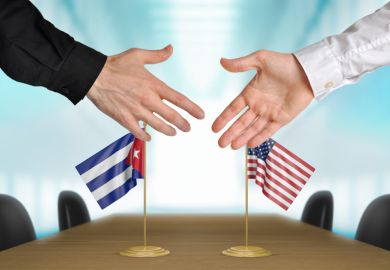Cuban higher education faces “uncertainty” after the election of Donald Trump as US president, according to a government minister.
Aurora Fernandez, vice minister at the Cuban Ministry of Higher Education, said that the thaw in relations with the US initiated by President Barack Obama’s visit to Cuba in 2011 had led to modest growth in links between universities in the two countries.
Between 3,000 and 4,000 US students were now coming to Cuba each year to study for a semester or a shorter period, and Cuban scholars were “just starting to go to US universities for research projects and to write papers”, Ms Fernandez told Times Higher Education. The improved links had “made a difference psychologically”, she added.
However, she acknowledged that the Trump presidency could endanger these developments.
“Trump hasn’t affected anything yet, the administration has done nothing to stop collaboration,” Ms Fernandez said. “We are crossing our fingers that won’t happen, but we have uncertainty in the near future.”
A slowing in the growth of links with the US could potentially offer opportunities for a post-Brexit UK keen to develop further partnerships beyond Europe, and Ms Fernandez was speaking during a visit by a Cuban higher education delegation organised by the Foreign and Commonwealth Office and Universities UK International.
Ms Fernandez said that Cuban collaboration with UK universities seemed to have tailed off in recent years and that she hoped to forge further links between individual universities to “increase staff-faculty interchange, joint research projects, joint PhD and master’s programmes”.
Areas for possible future collaboration include agricultural science, food production and renewable energy, as well as distance and English-language learning.
However, Ms Fernandez was concerned about the impact of the UK’s exit from the European Union on existing research consortia, which include academics from the UK and the EU.
While in the UK, the Cuban delegation also had meetings at Cass Business School, which, according to the vice minister, has already sent academics and students to her country to “talk about banking and taxes, which are not so known in Cuba”.
Might this suggest it was rethinking some of its core political principles?
Not at all, responded Ms Fernandez. Although it certainly hoped to “leave underdevelopment behind” and “develop the economy”, this would not be at the expense of their “socialism and solidarity and human values”.
Register to continue
Why register?
- Registration is free and only takes a moment
- Once registered, you can read 3 articles a month
- Sign up for our newsletter
Subscribe
Or subscribe for unlimited access to:
- Unlimited access to news, views, insights & reviews
- Digital editions
- Digital access to THE’s university and college rankings analysis
Already registered or a current subscriber?






